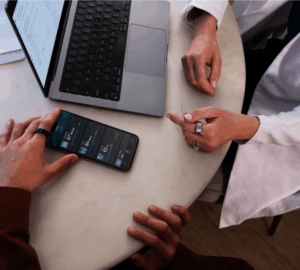Breaks during the workday support wellbeing, productivity, and focus that will help you stay resilient during the work week. They also bust stress, allowing you to ease into non-work time and get a better night of sleep while you’re at it.
Learning new information can be closely tied to purposeful breaks, too. If you are starting a new role, taking on fresh responsibilities, or working toward a certification, building breaks into your work week gives your brain the time it needs to integrate new information.
In a compelling 2022 meta-analysis, researchers found that micro-breaks, or breaks that are 10 minutes or fewer in length, may help support wellbeing. In fact, according to the study’s authors, “the data suggest that micro-breaks may be a panacea for fostering well-being during worktime.”
The study’s authors suggest these short and frequent breaks have a wide range of positive effects on wellbeing and work-related outcomes. Micro-breaks serve as a powerful tool to counteract the negative impacts of continuous work and create a more productive and healthy work environment.
Want to take a better break? In his book When: The Scientific Secrets of Perfect Timing, author Daniel Pink outlines the secrets to taking a healthy hiatus during the workday — restorative breaks. Inspired by Pink, here are 4 strategies for taking your best breaks yet.
RELATED: 4 Ways to Prevent Mental Fatigue & Information Overload
Moving Breaks
Research supports the idea that moving for 5 minutes for each hour of sitting may improve mood, reduce fatigue, and boost thinking and energy. According to another study, moving promotes motivation and attention.
Try It: Set a reminder to move each hour — your Oura App is great for this. Stretching, walking, or taking a few flights of stairs are solid options for getting your mind off of your to-do list and your blood moving.
Nature Breaks
The benefits of spending time in nature are numerous, and there is a growing body of research that suggests as much, reinforcing that we need time outside to feel vibrant and fulfilled. Taking a few breaks a week in nature has a positive impact on wellbeing.
Try It: Keep it simple — grab a cup of coffee or a snack and head outside to enjoy it, take moving breaks outdoors a few times each week, or if you can skip video and join a meeting from your phone, take your meeting to go. Use your Oura Ring to track your steps, length of your outdoor walk, and Workout Heart Rate.
Social Breaks
For some of us, just taking a break can be challenging, but research suggests that taking a break with others can have added benefits, especially when the focus is on non-work topics.
Try It: Find someone at work in need of a break and a quick chat about vacation plans or shared interests. If you work from home, identify other work from home friends you could call for a fun chat a few times a month.
Fully Detached Lunch Breaks
We’ve all done it — eaten a hurried, not-great meal at our desks in front of our computers, but research shows that taking a lunch break while fully setting work aside may have benefits that build over time. Get distracted and lost in your lunchtime, knowing that work-related tasks will be there when you’re finished eating, but this time is only for you.
Try It: Add a dedicated lunch break to your calendar so this time is allocated to you vs. meetings. Socialize this plan in your office or team so your colleagues know you’re devoting your lunch time to your wellbeing. If this is not possible every day, take these islands of respite when you can.
Timeout Tools
The alarm function on your phone can play a role that extends beyond rousing you from sleep – consider using it to alert you when it’s time for a break. If you use a shared work calendar, experiment with scheduling personal pauses to ensure they remain solely dedicated to your wellbeing. Oura can function similarly – be sure to have inactivity alerts set up, reminding you to stretch your legs if you’ve been inactive for 50 minutes. This can be a powerful tool to remind you to move and take a break.
Finding balance is challenging when work culture celebrates constant productivity, thus the importance of intentionally taking pauses during the workday cannot be emphasized enough. By taking brief respites, we can enhance our focus and concentration, reduce stress levels, improve emotional wellbeing, maintain physical health, and boost creativity and problem-solving abilities.
Experiment with different activities during your task-timeouts to find what works best for you, making sure to give yourself permission to pause and recharge. By prioritizing short intervals of time to rest your mind and defocus on your tasks, you can improve your wellbeing.
READ MORE: How Meditation & Oura Helped This Entrepreneur Bounce Back from Burnout











